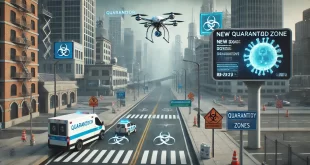The race to find a vaccine against “Covid-19” continues at an accelerated pace. According to warnings from the World Health Organization, obtaining a vaccine or effective treatments will not eradicate the disease. So what are the reasons for this, have infectious diseases been wiped out in the past, and why make similar statements, and finally what is preventing this virus from disappearing?
Writer Tifenn Clinkemaillié says in a report published in the French newspaper Lesechos.fr that the new Corona virus, which has infected around 20 million people, may not go away.
“This virus can be added to the list of endemic viruses circulating in our societies, and it may never disappear completely,” explains Michael J. Ryan, health emergency specialist at the World Health Organization.
The Director General of the World Health Organization, Tedros Adhanom Ghebreyesus, confirmed in early August that “there is no cure for the Corona virus, and there may never be of the future ”.
Can infectious disease be eliminated?
François Reno, researcher at the National Center for Scientific Research and specialist in infectious diseases, categorically answered this question: “It is impossible to completely eliminate infectious diseases, and there is an exception concerning smallpox, which the Organization world health declared eliminated ”.
“Apart from this exception, and to date, it is not possible to confirm the disappearance of any infectious disease. The proof is that the flu returns every year and measles has been around for thousands of years, ”so some diseases never go away.
“The virus must be controlled and coexist”, explains François Reno, and currently, control of the emerging corona virus depends on compliance with preventive measures and social distancing. In the long run, other means, such as vaccines and treatments, can help contain the epidemic without eliminating it.
“Thanks to treatments, we can now stop the human immunodeficiency virus (responsible for AIDS), because infected people are not sufficiently carriers of the virus to transmit it”, explains Stéphane de Witte, specialist in infectious diseases at Center hospitalier universitaire de Saint-Pierre, on French-speaking Belgian radio and television.
Why is the vaccine not a panacea?
The strength of this virus lies in its diversity, and François Reno explains that “vaccines are constantly evolving, there is an annual vaccine against influenza, and each year people die from mutations in the virus”. And it’s impossible for scientists to know what forms future mutations will take.
“If the virus undergoes many changes, the vaccine will be less effective”, says infectious disease specialist François Reno, adding that “the game of genetic combinations is very effective”.
It will therefore depend on the capacity of health systems to adapt their response over time. Commenting on attempts to find a vaccine, he said it was an “arms race”.
Despite this, the researcher maintains his optimism, saying that “the emerging corona virus is a single-stranded RNA virus, unlike the multistrand influenza virus”, so the mutations of the emerging corona virus may be less diverse than those of the virus. influenza.
The other difficulty is that the invention of a vaccine takes time, especially since it will be the first vaccine against the Corona virus. The announcement of the first Russian vaccine sparked a reaction from specialists.
The World Health Organization said that before any “prequalification” on its part, it had to verify through “strict procedures” all data collected during clinical trials in Russia.
Francois Palau, a professor at the Institute of Genetics at University College London, said the Russian statement was “discredited and meaningless” because no product has been properly tested and could have dire consequences.
Is herd immunity achievable?
“Today, we know nothing about this question, or we have little information on the immunity of herds in relation to this viral epidemic,” explains François Reynaud. Group immunity can occur when the majority of the population naturally develops immune resistance, but this phenomenon is particularly effective when there is a potential vaccination, which acts as a firewall.
According to the researcher from the National Center for Scientific Research, “there is currently no vaccine, and for people who have already contracted the disease, we still do not know the real coverage we have or the extent of continuity. their immunity.
Collective immunity in the time of Corona
Several studies, notably from the Institut Pasteur, provide answers in this regard. On May 13, the institute estimated that only about 4.4% of the population had been affected by Corona disease, which is well below the 60% needed to achieve herd immunity.
In terms of continuity, a British study, which has not yet been evaluated, shows that antibody-based immunity wears off within months, a factor that can make the development of herd immunity complicated or even impossible.
According to the study, “if the infection has antibody levels that decrease within two or three months, the vaccine may do the same, and one dose may not be enough”.
Post-covid syndrome
British expert Paul Garner, an infectious disease specialist in Liverpool, explains that “because former patients believed to be cured complain of a return of symptoms, according to provisional estimates, post-covid syndrome Covid can affect 5 to 10% of French people with corona ”.
He confirms that “no one knows to what extent the disease can cause immune changes in the body, or any other strange disease that cannot be explained now”.
He adds: “We can assume that there will be serious pulmonary, neurological, cardiac and musculoskeletal complications in some survivors of Covid-19, resulting in restriction of activity”, according to the expectations of the Health Authority supreme in a note published on April 16.
 Etudes Non Stop Study Non Stop
Etudes Non Stop Study Non Stop



